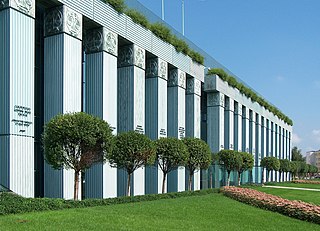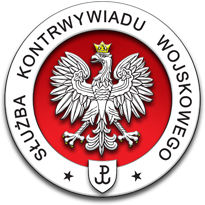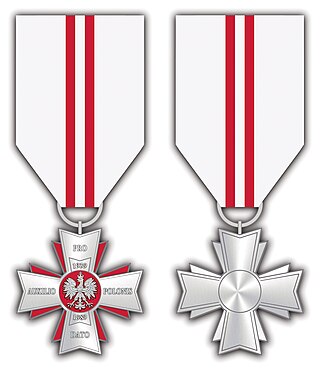A wójt is the highest administrative officer of a Polish rural gmina, i.e., of a commune (gmina) comprising only villages.

The Supreme Court is the highest court in the Republic of Poland. It is located in the Krasiński Square, Warsaw.

The State Tribunal of the Republic of Poland is the judicial body, which rules on the constitutional liability of people holding the highest offices of state. It examines cases concerning the infringement of the Constitution and laws or crimes committed by the President, members of the government, the President of the Supreme Chamber of Control, the President of the National Bank of Poland, heads of central administrative offices and other senior state officials.

The Central Anticorruption Bureau is a division of the Polish government, reporting to the Prime Minister of Poland, responsible for addressing corruption in Poland. Located in Warsaw, the CBA has been functional since 24 July 2006, having been activated by the June 2006 Central Anticorruption Bureau Bill. While it works in both public and private sectors, it is particularly focused on combatting corruption in State and self-government institutions. Its scope includes both investigating criminal corruption and preventing corruption which is not yet criminal. It is given the duty of informing the Prime Minister, the President of Poland and the National Assembly of the Republic of Poland of matters which may affect the economic well-being of the Polish state.

Health care in Poland is insurance based, delivered through a publicly funded health care system called the Narodowy Fundusz Zdrowia, which is free for all the citizens of Poland provided they fall into the "insured" category. According to Article 68 of the Polish Constitution everyone has a right to have access to health care. Citizens are granted equal access to the publicly funded healthcare system. In particular, the government is obliged to provide free health care to young children, pregnant women, disabled people, and the elderly. However, private health care use is very extensive in Poland. Patients who are uninsured have to pay the full cost of medical services. According to a study conducted by CBOS in 2016, out of 84% patients taking part in the survey, 40% declared use of both private and public health services, 37% use only public health care, and 7% use only private health services. 77% of all responders declared using private health care is caused by long waiting for public health care services.

The Polish Space Agency is the space agency of Poland, administered by the Ministry of Development, Labour and Technology. It is a member of the European Space Agency. The agency is focused on developing satellite networks and space technologies in Poland. It was established on 26 September 2014, and its headquarters are located in Gdańsk, Poland.

The Military Counterintelligence Service is one of the principal intelligence agencies of Poland. It is responsible for the protection of Poland against internal threats and for the combat capability of the Polish Armed Forces.
This is a list of the legality of muscimol mushrooms by country.
In Poland, public roads are classified into two kinds of road hierarchies: road classes and road categories.

The Virtus et Fraternitas Medal is a Polish state decoration established on 9 November 2017.

The Western Cross is a Polish decoration established on 7 April 2017.

Museum of Applied Arts in Poznań is a branch of the National Museum in Poznań, art museum opened in 1965 as the Museum of Arts and Crafts. Since 1991, in connection with the expansion of the collection profile and the change of the exhibition, under the current name. It is located in the Royal Castle in Poznań, built in 1249, initially as a residential tower of the PoznańPrince Przemysl I.

The Office of the Polish Data Protection Commissioner or officially President of the Personal Data Protection Office is an independent national data protection authority responsible for upholding the European Union fundamental right of individuals to data privacy through the enforcement and monitoring of compliance with data protection legislation in Poland. It was established in 1997 as the Bureau of the General Inspector of the Personal Data Protection.

Honorary badge of Anti-communist opposition activist or repressed person for political reasons is a Polish honorary badge, which is awarded by the Head of the Office for Veterans and Victims of Oppression to anti-communist opposition activists and people repressed for political reasons during the Polish People's Republic.

National road 68 is a main road of accelerated traffic belonging to the Polish national road network. The length of the route is 11.4 kilometres (7.1 mi), of which 5.197 kilometres (3.229 mi) is maintained by General Directorate for National Roads and Highways. The highway connects the Kukuryki border crossing on Belarus–Poland border with national road 2 in Wólka Dobryńska. It runs entirely in Lublin Voivodeship, in Biała County. According to signage, national road 68 is a component of European highway E30.

National road 37 is a main road (Polish: droga główna, droga klasy G) route belonging to Polish national roads network, located in West Pomeranian Voivodeship. With its length of 14.6 kilometres (9.1 mi), the route connects the town of Darłowo with national road 6 near Karwice. In the future a new junction will be constructed, linking road 37 with expressway S6.

National road 96 is a main road of accelerated traffic, belonging to Polish national roads network, with length of 1.5 kilometres (0.93 mi) and located in Toruń County. It connects motorway A1 with national road 15. With its length, the route is the shortest one of all national roads in Poland.














